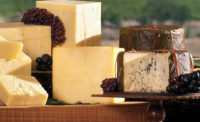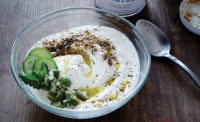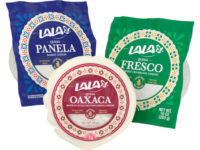Specialty cheese sales are on the rise, noted Rachel Kerr, director of events and public relations for Wisconsin Milk Marketing Board (WMMB), Madison. Wisconsin crafts nearly half, 47%, of the nation’s total specialty cheese. According to WMMB’s custom IRI database, the specialty cheese category grew by 6.3% in volume sales over the past year, versus 2.6% for the cheese category overall.
Kerr identified three key trends in specialty cheese: collaborative projects, flavored cheeses and organic products.
Collaborative projects
Specialty cheesemakers are always looking for new ways to excite consumers, Kerr said. In Wisconsin, cheesemakers are turning to one another to develop unique artisan collaborations. For example, Red Barn Family Farms recently partnered with Wisconsin Master Cheesemaker Jon Metzig from Willow Creek Creamery on a new washed-rind alpine-style cheese called Le Rouge.
The Artisan Cheese Exchange, founded by Wisconsin cheese grader Chris Gentine, is another Wisconsin cheese company that has teamed up with local cheesemakers, including Sid Cook of Carr Valley Cheese Co. and Kerry Henning of Henning Wisconsin Cheese. Cook collaborated with The Artisan Cheese Exchange on The Blue Jay, a juniper berry blue cheese, while Henning helped create The Stag, an aged cheddar and best in class winner at the 2017 American Cheese Society competition, according to Kerr.
Flavored cheeses
Kerr said Wisconsin cheesemakers are embracing the flavored cheese trend by developing unique flavored cheeses and specialty lines. Going beyond the traditional pepper Jack, these new introductions start with high-quality Wisconsin cheese and add premium ingredients, including various chiles, unique spice blends and even espresso, Kerr said.
Over the past three years, flavored cheese growth has averaged 2.2% per year in pounds and 3.8% per year in dollars, with the strongest growth coming in 2015, Kerr noted. The flavored cheese segment now accounts for almost 8% of total cheese sales in terms of pounds, and over 9% of cheese sales in terms of dollars, she said.
Consumer demand for spicy cheese, in particular, has impacted the flavored cheese category, Kerr noted. In fact, the Wisconsin Cheesemakers Association added three new classes dedicated to spicy cheese at this year’s U.S. Cheese Championship Contest — Open Class Pepper Flavored Cheeses in Mild Heat, Medium Heat and High Heat.
Organic products
Organic cheese is also in growth mode, according to Kerr.
“As consumers grow increasingly more aware of the foods they eat and the ingredients used, we are seeing a rise in the number of organic specialty cheeses,” Kerr said. “Sales of organic cheese have, in fact, more than tripled since 2011, with young millennials accounting for 45% of those sales.”
Kerr added that Wisconsin leads the nation in the number of organic dairy farms and is home to more organic farmers than any other state. There are 25 companies that manufacture organic cheese, including Roth Cheese Organic Grand Cru Reserve, which took home first place in the washed rind cheese category at the 2017 American Cheese Society competition.
A snapshot of specialty-type cheeses
More than 900 artisan, farmstead and specialty cheesemakers are currently in operation in the United States, according to a 2016 American Cheese Society (ACS) survey-based report titled “U.S. Artisan/Specialty Cheese Industry.”
ACS reported that 74% of these cheesemakers produced 50,000 pounds of cheese or less in the year leading up to the survey; 66% made their cheese using milk from their own animals; and 67% of businesses reported gross revenues under $500,000. The profit margins were slim, according to the report, with 23% of cheesemakers indicating their businesses did not turn a profit.
Understanding cheese types
In its 2016 report, ACS breaks down the differences between artisan, farmstead and specialty cheese.
Artisan cheese: The word “artisan” or “artisanal” implies that a cheese is produced primarily by hand, in small batches, with particular attention paid to the tradition of the cheesemaker’s art, and thus using as little mechanization as possible in the production of the cheese. It may be made from all types of milk and may include various flavorings.
Farmstead cheese: For a cheese to be classified as “farmstead,” it must be made with milk from the farmer’s own herd, or flock, on the farm where the animals are raised. Milk used in the production of farmstead cheeses may not be obtained from any outside source. It may be made from all types of milk and may include various flavorings.
Specialty cheese: Specialty cheese is defined as a cheese of limited production, with particular attention paid to natural flavor and texture profiles. Specialty cheeses may be made from all types of milk (cow, sheep, goat, etc.) and may include flavorings such as herbs, spices, fruits and nuts.
Check out an interview with two specialty cheesemakers







